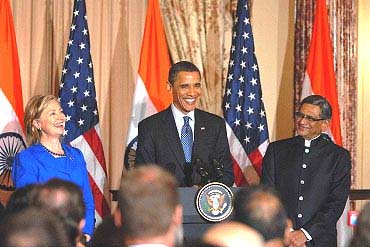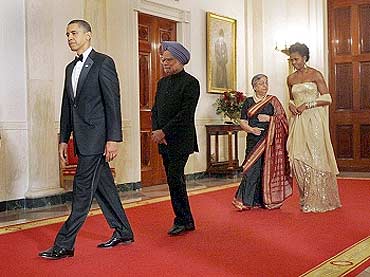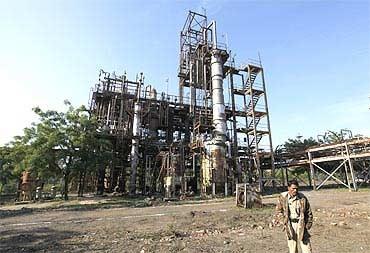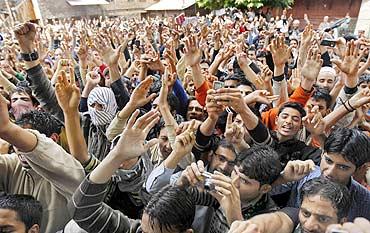Photographs: Paresh Gandhi/Rediff.com
In an exclusive and wide-ranging interview with Rediff.com's Aziz Haniffa, Blake discussed the recent inaugural US-India Strategic Dialogue, the fate of the nuclear liability bill in the wake of the Bhopal tragedy verdict, the imminent easing of export controls on India, and the sale of China's nuclear reactors to Pakistan.
Since the inaugural US-India Strategic Dialogue, you have been on a veritable blitz in speaking about these meetings -- from briefings to Web chats to blog forums. What's with this campaign? Is it to show the US administration's commitment to this relationship, which some analysts and commentators in both India and the United States had raised doubts about?
It's certainly to show commitment to the relationship, but it's part of Secretary (of State Hillary) Clinton's priority that she attaches to public diplomacy and to doing as much public outreach as possible about the initiatives that we and the (US) State Department are undertaking.
We are very proud of the progress we are making with India and we think it's also important to try to dispel some of the doubts you referred to. So, as with any big dialogue that we have with China or Brazil or any of the other countries, we do this kind of thing. And, we are also expanding now to use a lot of the new social media.
'Strategic dialogue paved the way for Obama's visit'
Image: Obama with Dr Manmohan Singh, Michelle Obama and Gursharan Kaur at the state dinner, November 2009Photographs: Jason Reed/Reuters
To be honest, we decided we really didn't need to have too many deliverables and we really did decide that what was important was to emphasise the strategic nature of this dialogue.
This marked the first time that we've had very senior ministers from both governments across the table to think strategically about how to take our relations forward, particularly in preparation for the president's very important visit in November. That was the real deliverable in getting all of these people together and the very productive dialogue that ensued and the very good ideas that emerged from that.
Two of the major initiatives on the anvil are energy and education and on both fronts, India is still to ratify the nuclear liability legislation and the education bill in order to garner the involvement and investment of American universities and colleges. So on both these fronts, is the ball squarely in India's court?
The ball is in India's court on those two fronts. We were pleased to hear from our Indian friends that they are strongly committed to the passage of both of those bills hopefully this year and we really leave it to them to manage the often complicated process of moving this through the Lok Sabha, because of course, there is some opposition to these and we recognise that.
It is important to underline that these are things that are going to benefit India as much as they are going to benefit the United States.
The nuclear legislation when it goes through will enable the American companies to establish new nuclear reactor parks in Andhra Pradesh, Gujarat, that will have a significant impact on India's energy future both in terms of providing a significant new source of electricity, but also in terms of a new source of lower carbon electricity very important to both of our futures.
The education bill, likewise, is going to be an extremely important part of ensuring that India can continue to be a knowledge-based economy.
India is now in the process of putting in place a right to education process that will graduate large numbers of secondary students many of whom will aspire to higher education and India presently does not have the capacity to provide that.
So they really see that the United States is in a unique position to help them by providing these investments by enabling American universities of all different kinds -- from community colleges right up to our Ivy League universities -- to come in and help to meet that capacity and that will also benefit us because our students can begin more study in India and perhaps even more importantly, our universities will be able to start to do much more in the way of joint research and development.
'Row over liability bill is India's affair'
Image: The Union Carbide plant in BhopalPhotographs: Reinhard Krause/Reuters
Now in the wake of the court verdict -- and for instance the opposition has come out very strongly saying that the liability bill should be dumped -- are the liability caps justified?
I don't really want to look at that issue. That is really for the Indian government to decide. Our interests are to ensure that the bill that ultimately is enacted is compliant with the international standards in this area, which is the Convention on Supplementary Compensation.
That is our chief interest and issues like what should be the cap on liability, is really up to the Indian government to decide and we trust their judgment because they have an interest in providing a regime that will be attractive to investors.
At your briefing the other day, you spoke about easing export controls on India before President Obama's visit, which has been one of the pet peeves the Indian side and Foreign Secretary Nirupama Rao also discussed this with Under Secretary Bill Burns (on the sidelines of the US-India Strategic Dialogue>).
You did mention that there would be a focus on weakening some of those restrictions on entities like the Indian Space Research Organisation and the Defence Research and Development Organisation. Are these already in the works?
Yes. Discussions are underway about, perhaps, reducing the entities list, and I am confident we are going to be able to make progress before the president's visit, and I believe that such progress would then enable us to really think about some quite exciting new initiatives in the areas like space cooperation, in areas like defence co-production and co-development, because that's going to be really the next era of defence cooperation between the United States and India, and again, reflects the progress that we've made on defence cooperation.
So, I also hope that we will see some progress on the Indian side on things like lifting the cap on defence -- in foreign direct investment -- because that will provide an incentive for our companies to invest more in Indian companies, and again, to take this process forward.
'No disconnect within US over Kashmir'
Image: Kashmiri protesters during a protest organised by the Hurriyat Conference in SrinagarPhotographs: Fayaz Kabli/Reuters
You also told the BBC that, those are really the red-lines they've established for re-establishing the composite dialogue. But senior Pentagon officials, including Admiral Mike Mullen (chairman of the US Joint Chiefs of Staff) have contended that if the Kashmir issue can be resolved it could help alleviate the threat of terrorism, and they (Pentagon officials) have suggested that it could also lead to Pakistan moving the troops massed on the border with India to the western front and help in the fight against the Taliban and Al Qaeda in Afghanistan.
So is there a disconnect here between the State Department and the Pentagon?
No, there is no disconnect. I agree with what Admiral Mullen said that the resolution of the Kashmir issue would have very far-reaching implications for not only Indo-Pakistani relations, but also for just the kind of movement of troops that he described.
I think he would agree though, that it's a question of sequencing. The two countries are not going to just start talking about Kashmir.
They will have to build up to that and develop sufficient trust and confidence to begin to discuss what are the most sensitive issues on their agenda that is these territorial issues that have long bedeviled the two countries.
But let me stress that this is really something for the two countries to decide. The United States does not have any kind of role in that sequencing or the pace or the scope of the character of that dialogue.
But we obviously encourage our two friends in trying to resolve their differences because it would have such an important benefits not only for them but also for several far wider efforts in places like Pakistan and Afghanistan.
Is it then fair to assume that you'll have kept the pressure on Pakistan to make sure that the Mumbai terrorists are brought to justice? That Lashkar and other Punjabi groups that have been crossing the border and infiltrating into India are checked?
Has that been a constant refrain or has there been any easing of pressure at any time due to strategic interests perhaps?
No, it definitely remains a very high priority, and we'll continue to encourage that. The important thing now is to understand that Pakistan needs to just show visible progress on those issues and that will then open the door for I think, a much wider scope of cooperation to take advantage of the tremendous trade opportunities.
I saw that (Commerce) Minister (Anand) Sharma recent met with (Pakistani) Foreign Minister (Mahmood) Qureshi and they agreed that there are tremendous opportunities afforded by trade.
So, both sides are well aware of the great new opportunities that would arise.
'Not so circumspect on China's bonhomie with Pak'
Image: A Chinese honour guard for Pakistan President Asif Ali Zardari in BeijingPhotographs: David Gray/Reuters
Why has the US been sort of so circumspect on this?
I don't think we've been that circumspect. I was asked about this when I went to China for our dialogue on South Asian issues and I said that we think that this should receive consideration by the Nuclear Suppliers Group and that it's up to them to determine whether there should be any kind of exception to their guidelines on this issue. And that remains our position.
And if these sales goes through without NSG exemption is that something you'll protest? Are these concerns you'll bring to the NSG and other members of the NSG?
Let's see. I am confident that this will be a subject of the NSG discussions next week when they meet in New Zealand. So, let's wait and see the outcome of that.
Why is it that the US-India meetings was a Strategic Dialogue and the US-China was both a Strategic and Economic Dialogue? Does that show that you'll have gone much further vis-a-vis China?
That's an important question because I think that sometimes there's a misunderstanding about what the purpose of the strategic dialogue is.
The purpose of the strategic dialogue between India and the United States is not to replace the 18 other dialogues that we have that cover in great detail trade and financial issues and many of the economic issues that you referred to.
It's more to provide an overarching look at where to take the relationship forward, and how to capture and take advantage of some of the opportunities that we have before us.
It's in no way to subsume these other dialogues, which will remain extremely important.






article